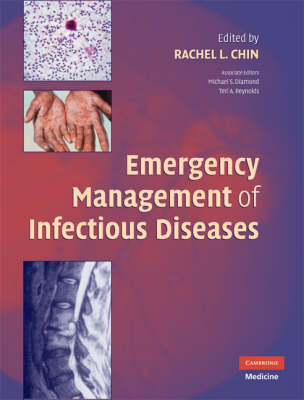
Emergency Management of Infectious Diseases
Cambridge University Press (Verlag)
978-0-521-87176-1 (ISBN)
- Titel erscheint in neuer Auflage
- Artikel merken
Infectious disease ranks only behind trauma in the prevalence of cases seen on a daily basis in the emergency room and takes lives from every culture and socioeconomic class. The changing epidemiology of infectious diseases is a considerable challenge to any physician, as acute, nearly eradicated, and tropical diseases now enter American emergency rooms on a daily basis. This book is a new clinically oriented reference book for the management of such infections in the emergency room and focuses on all diagnostic protocols and treatment strategies that emergency room physicians need to be proficient in when managing patients battling infectious disease. The orientation of the book is uniquely organ-based, with coverage of all viral, bacterial, fungal, and parasitic disease. The narrative is supplemented with explanatory photos, diagnostic tables, and charts of drug regimens and will prove an invaluable reference for physicians confronting the various manifestations of infectious disease.
Dr Rachel L. Chin is a Professor of Clinical Medicine at the University of California, San Francisco School of Medicine, and a doctor in the Department of Emergency Services at San Francisco General Hospital. Dr Chin holds dual board certification in the areas of emergency medicine and infectious diseases. She has lectured and written extensively on emergency infectious disease management and was a primary faculty member at the 2004–2005 American College of Emergency Medicine meeting.
Part I. Systems: Section A. Cardiovascular Infections: 1. Infective bacterial endocarditis; 2. Myocarditis and pericarditis; Section B. Dental Infections: 3. Dental and odontogenic infections; Section C. Dermatology: 4. Systemic diseases causing fever and rash; Section D. ENT: 5. Otitis media; 6. Otitis externa; 7. Sinusitis; 8. Supraglottitis; 9. Pharyngitis and tonsilitis; 10. Deep neck space infections; 11. Mumps; Section E. Gastrointestinal Infections: 12. Peritonitis; 13. Hepatitis; 14. Infectious biliary disease (cholangitis, cholecystitis); 15. Acute infectious diarrhea; 16. HIV and diarrhea; Section F. Genital Infections and Sexually Transmitted Diseases: 17. Ulcerative sexual transmitted diseases; 18. Non-ulcerative sexual transmitted diseases; 19. Vulvovaginitis; 20. Male genitourinary infections (urethritis, epididymitis, prostatitis); Section G. Orthopedics: 21. Adult septic arthritis; 22. Hand infections; 23. Osteomyelitis; 24. Open fractures; 25. Spinal infections; 26. Prosthetic joint infections; 27. Diabetic foot infections; 28. Plantar puncture wounds; Section H. Opthalmology: 29. Periocular infections; 30. Infections of the conjunctivitis, sclera, and cornea; 31. Infections of the uvea, vitreous, and retina; Section I. Pulmonary: 32. Community acquired pneumonia; 33. Tuberculosis; 34. Human influenza; 35. HIV associated respiratory infections; Section J. Rheumatology: 36. Infectious arthritis; Section K. Nephrology: 37. UTI; 38. Pyelonephritis; Section L. Neurology: 39. Fever and HA (meningitis, encephalitis); 40. Fever and focal cerebral dysfunction; 41. Fever and acute weakness localizing to the spinal cord (epidural abscess); 42. HIV and altered mental states; Section M. Skin and Soft Tissue Infections: 43. Skin and soft tissue infections; Part II. Pediatrics: 44. Pediatric fever and rash; 45. Work up of newborn fever; 46. Febrile child; 47. Pediatric orthopedic infections; 48. Urinary tract infections in children; 49. Respiratory infections; Part III. Special Populations: 50. Bites; 51. Complications from chemotherapy; 52. Ectoparasites; 53. Fever in pregnancy; 54. Fever in the returning traveller; 55. Infections in intravenous drug users; 56. Post-exposure prophylaxis; 57. Post-operative infections; 58. Post-partum infections/post-abortion infections; 59. The febrile post-transplant patient; 60. Rabies; 61. Septic shock; 62. Sickle cell disease infections; 63. Tetanus; Part IV. Current Topics: Section A. Bioterrorism: 64. Anthrax; 65. Botulism; 66. Plague; 67. Smallpox; 68. Tularemia; 69. Viral hemmorrhagic fever; Section B. Emerging Infection: 70. Hanta-virus; 71. Avian flu (h5n1); 72. SARS; 73. West Nile virus; Part V. Overview of Antibiotics: 74. Overview of antibiotics; Part VI. Microbiology/Laboratory Tests: 75. Microbiology/ laboratory tests; Part VII. Infection Control Precautions: 76. Infection control precautions.
| Erscheint lt. Verlag | 30.6.2008 |
|---|---|
| Zusatzinfo | 396 Tables, unspecified; 1 Maps; 30 Halftones, unspecified; 13 Line drawings, unspecified; 100 Line drawings, color |
| Verlagsort | Cambridge |
| Sprache | englisch |
| Maße | 225 x 286 mm |
| Gewicht | 1950 g |
| Themenwelt | Medizin / Pharmazie ► Medizinische Fachgebiete ► Notfallmedizin |
| Studium ► Querschnittsbereiche ► Infektiologie / Immunologie | |
| ISBN-10 | 0-521-87176-X / 052187176X |
| ISBN-13 | 978-0-521-87176-1 / 9780521871761 |
| Zustand | Neuware |
| Informationen gemäß Produktsicherheitsverordnung (GPSR) | |
| Haben Sie eine Frage zum Produkt? |
aus dem Bereich



